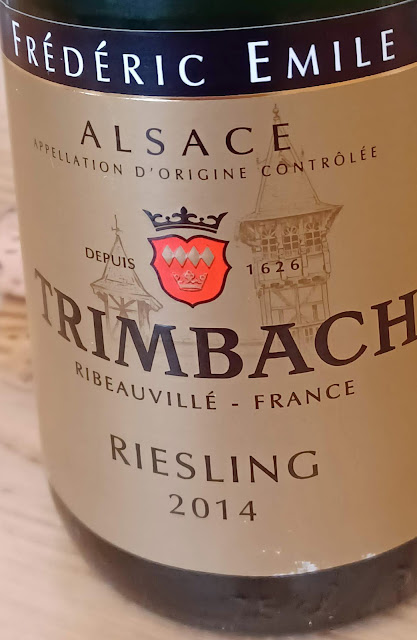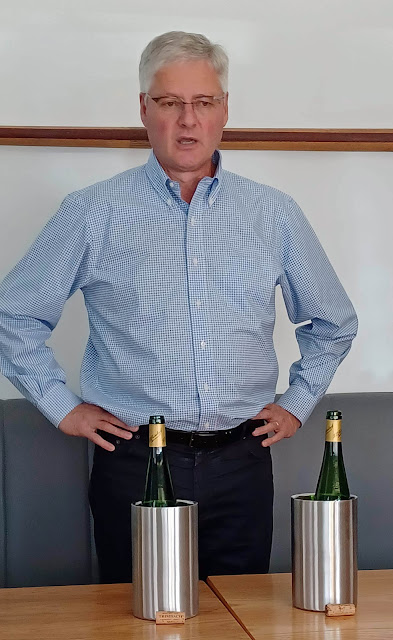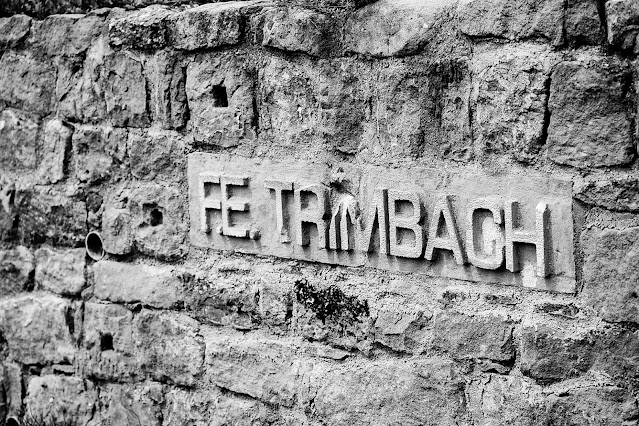Trimbach Wines Shine in Kinsale. Founded in Alsace in 1626. "The family is still the soul."
 |
| An iconic wine, at No 6 in the most searched for Riesling on Wine-Searcher.com. Their Le Clos Sainte Hune is No 1 |
“I can retire slowly but I don't want to do it, even though the 13th and 14th generations of the family are now getting into it.” That was the legendary Jean Trimbach of the legendary Alsace family speaking, with a big smile, during a tasting of his wines (organised by Bibendum Ireland) in The White House (Kinsale).
Hard to blame him for staying on: ”Long lazy lunches and dinners, with great food and wine. No need to leave.” These are also the reasons why the younger generations get drawn into the family business which started in 1626.
Believe it or not, it was another Jean who started the business all those centuries ago. He left Switzerland and ended up in Alsace. His surname wasn’t Trimbach but that name stuck as it was the name of the Swiss village that he had left behind.
Jean emphasised that the business is “all about the family style”. And so we have crisp Riesling, elegant Pinot Noir and so on. His brother Pierre and Jean's son Julien are now in charge of production. “I see reports in the wine press how this winemaker has moved to a different winery and that winemaker has replaced him. I wonder what happens to the soul of the winery in that case. In Trimbach, the family is at the soul of the winemaking.”
 |
| Jean's everyday wine! |
We did of course get to taste that elegant Pinot Noir, a grape that he admitted that they knew little about 30 years ago. Now, “we understand it better, much better, keep the yields low. And the quality will grow into the future. No oak in these wines except foudres, some of them really old”.
A few years back, Jean-Fredéric Hugel (of another leading Alsace family) told me that, due to global warming, the quality of Alsace Pinot Noir is “incomparable to that of 20 years previously”. Jean Trimbach acknowledged climate change but was more inclined to credit the improvement in the Pinot to the growing expertise of the winemakers over those decades.
He did say though that “climate is the first problem”. “In 2003, we knew nothing, now we know.” But he was encouraged by how the land has reacted: “Vineyards handle the heat better than us!”
The tasting started with the crystal clear Pinot Gris Reserve 2018. Jean was at pains to emphasise that this is a French grape, distinct from Pinot Grigio! We soon confirmed that its generous character goes wonderfully with the pleasures of the table, thanks to a selection of very tasty bites from the White House Kitchen.
Then we were onto “a treasure of the castle on the hill”. The Schlossberg Grand Cru Riesling, dry, delicate, and chiseled, comes from a granitic terroir, all the other grapes at the tasting grow on a limestone base. Great to have a glass of this in hand as it has a very limited production.
Jean, who has been in this role since 1985, is always quick to point to the advantages that Alsace has, particularly when it comes to Burgundy. “We have more Grand Cru wines than Burgundy because they have no granite, no volcanic, no slate.. We have them all!” That big smile followed!
They export all over the world but France is a most important market and the home country gets a bigger allocation of their Grand Cru wines. “There are some thirty 3-star Michelin restaurants in France, we are in 27 of them and are talking to the other three!” And the person doing that hard talking is none other than Jean’s daughter Pauline who heads up the sales team in France.
Now we were on to another treasure, the prestigious signature of the house (first seen in 1967), Cuvée Frédéric Emile, a dry and powerful Riesling, an iconic wine and Jean’s favourite. Really amazing and a privilege to taste.
Just one red in the tasting and that was the Pinot Noir Réserve 2020. “Easy drinking,” declared Jean, “almost a glu-glu wine.” He had earlier used glu-glu to describe the Pinot Gris. Charcuterie, smoked meats, poultry, certain cheeses are among the Pinot Noir pairings but Jean, pointing to its smoke aromas, said it is also a terrific match for smoked salmon and underlined that by saying “We sell a lot of it in Japan”.
There was of course something sweet to finish on: Gewurztraminer Vendanges Tardives (which is only produced in great years). Vendanges Tardives means late harvest and the very ripe grapes are usually (nowadays) picked in mid-October, well before the danger of frost which doesn't hit the Alsace until December. We enjoyed its natural sweetness. Jean’s verdict: “..not super sweet but sweet enough.”
 |
| Not super sweet but sweet enough |
The producers recommend it as an aperitif or with foie gras, dishes in rich sauces, veal, and poultry with cream and mushrooms. It can also be fully appreciated with spicy cuisine such as Chinese cuisine, lacquered duck for example, powerful cheeses, and fresh and fruity desserts.
And a few minutes later Jean, who had flown in early that morning for the Kinsale lunch, left the room and, with Bibendum’s Mark Redmond at the wheel, was driven off to the Cashel Palace for a sold-out wine dinner a few hours later.
Busy man!




No comments:
Post a Comment